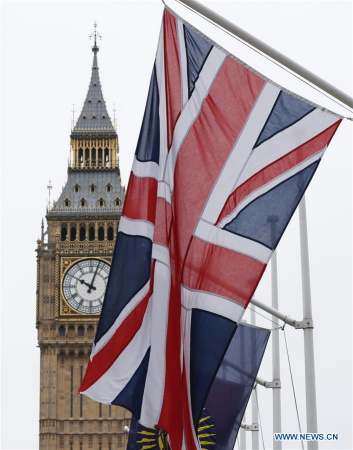
Photo taken on March 14, 2017 shows the "Big Ben" and the UK flag in central London, Britain. The British upper house of the Parliament passed the Brexit Bill Monday night, clearing the last hurdle for the government to trigger Brexit. (Xinhua/Han Yan)
Britain is to trigger the process for leaving the European Union on March 29, it was announced Monday by 10 Downing Street.
Britain's Permanent Representative to the European Union Tim Barrow Monday morning informed the office of European Council President Donald Tusk of Britain's intention to invoke Article 50 of the Lisbon Treaty on March 29, 2017.
May is expected to make a full statement to MPs in the House of Commons immediately after the triggering of the Article 50 on next Wednesday.
The launch of the Article 50 means the starting of a two-year Brexit talks between London and Brussels on a deal to determine Britain's future relationship with the remaining 27 member states of the EU.
That also means the final departure will be no later than March 2019.
The announcement Monday meets British Prime Minister Theresa May's longstanding commitment to trigger Article 50 by the end of March 2017.
Secretary of State for Exiting the European Union David Davis said "Last June, the people of the UK made the historic decision to leave the EU. Next Wednesday, the Government will deliver on that decision and formally start the process by triggering Article 50."
The Brexit secretary said Britain will then be engaged in the most important negotiation "for a generation."
The British announcement comes as EU leaders are preparing for a gathering in Rome later this week to mark the 60th anniversary of the Treaties of Rome, which established the European Economic Community (EEC), forerunner to the current EU. May has already announced she will not be attending the event.
May embarked Monday on a tour of Britain as part of ongoing engagements with devolved regions ahead of triggering the Article 50.
May's tour started in Wales, and will be followed by visits to Scotland and Northern Ireland.
Downing Street said in London the tour was part of a series of visits around Britain to enable the prime minister to engage and listen to people from across the nation as it prepares to leave the EU.
Ahead of her departure Monday morning, May said "From my first day on the steps of Downing Street, I made clear my determination to strengthen and sustain the precious union. I have also been clear that as we leave the European Union I will work to deliver a deal that works for the whole of the UK. I want every part of the United Kingdom to be able to make the most of the opportunities ahead."
May's tour will also take her to Scotland where the Scottish Parliament will be voting Wednesday after a two-day debate whether to back a new independence referendum to form a breakaway country outside of the United Kingdom.
Scotland's first minister Nicola Sturgeon wants a referendum before a final Brexit deal is sealed with Brussels. May has said now is not the time for Scotland to vote on independence, preferring to wait until after Brexit.
Media in Scotland Monday are focusing on what currency Scotland will adopt if it becomes independent, with choice ranging from the pound sterling to a new currency, though Scotland's former first minister, the SNP's Alex Salmond, has ruled out euro as a currency in Scotland.
The Evening Standard in London reported Monday that a latest opinion poll shows support for Scottish independence is lower today than it was in 2014 when the first independence poll was held.
The poll puts backing for Scottish independence at 44 percent, one point lower than when the question was put to Scotland two-and-a-half years ago, while a majority (56 percent) would vote to remain in the UK.
Scottish voters backed remaining in the EU by 62 percent to 38 percent in the Brexit vote last June, compared to the final result for the whole of Britain of 52 percent to 48 percent.


















































